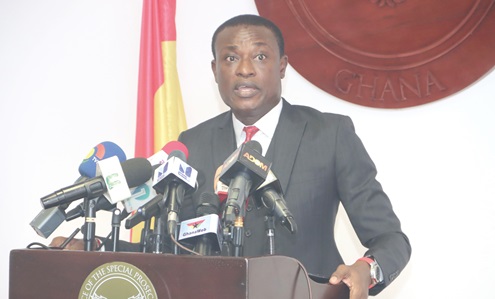The Special Prosecutor (SP), Kissi Agyebeng, has described the Office of the Special Prosecutor (OSP) as “our best bet in tackling corruption.”
He emphasised the unique legal framework of the model, its operational independence and broadened mandate as critical strengths in the country’s fight against corruption.
Speaking at the African Union high-level Conference on Ghana’s Anti-Corruption Architecture in Accra last Friday, Mr Agyebeng said the model was a “unique and unprecedented remedy”, designed to correct the inadequacies of traditional approaches that lacked real legal and enforcement powers and operational independence.
He lauded the passage of the Office of the Special Prosecutor Act, 2017 (Act 959), which established the OSP in 2018, as a flagship anti-corruption institution of the country.
Mr Agyebeng said the OSP was set up with a unique fourfold mandate of investigating corruption and corruption-related cases, prosecuting suspected offenders, recovering , managing assets, and taking steps to prevent corruption.
“The model gives the OSP full control over the initiation and conduct of investigations, as well as the institution of criminal proceedings. It is politically neutral and non-selective in its operations,” he said.
The SP stressed that, for the first time in Ghana’s history, the fight against corruption had been extended beyond public office holders to include politically exposed persons (PEPs) and individuals in the private sector.
Conference
The conference was organised by the African Union Advisory Board Against Corruption (AUABC), a specialised organ of the African Union established in 2009 to promote and enhance the implementation of the African Union Convention on Preventing and Combating Corruption (AUCPCC).

It was held on the theme: Revitalising the Anti-corruption Architecture in Africa: Ghana’s Accountability Journey”.
It was also to commemorate two decades of AUCPCC.
Present at the conference were the Vice-President, Professor Naana Jane Opoku-Agyemang, the Commissioner of Human Rights and Administrative Justice (CHRAJ), Joseph Whittal, the Chairperson of AUABC, Seynabou Ndiaye Diakhaté, a board member for AUABC, Yvonne Mutepuka Chibiya; the Chief of Staff at the Office of the Vice-President, Alex Segbefia, ministers of state, a lawyer and antigraft campaigner, Oliver Barker-Vormawor; representatives from the security services, members of the diplomatic corps, among others.
Inception
Mr Agyebeng said that although the OSP was initially born out of a campaign promise during the 2016 elections, it had since evolved into a legal embodiment of the country’s international obligations under both the United Nations and African Union anti-corruption treaties.
“The legal foundation of the OSP is not based solely on domestic law but also on international principles such as the Jakarta Statement on Principles for Anti-Corruption Agencies, which advocates independence, clear mandates and adequate resources for such bodies,” he added.
“While the establishment of the OSP fulfilled a political promise, it is, more importantly, a fulfilment of Ghana’s treaty obligations.
Its creation aligns with Article 6 and Article 36 of the United Nations Convention Against Corruption and Article 5(3) of the AU Convention,” the SP said.
Challenges
Acknowledging the strengths and limitations, Mr Agyebeng urged that the OSP model be strengthened during the ongoing constitutional review process to match the complexity of modern financial crimes.
“The model is not without shortcomings — such is the nature of any human construct.
Yet, we have a golden opportunity to reshape it during the ongoing constitutional review process to better serve our national objectives.
In doing so, we must remember that the fight against corruption is multifaceted,” the SP added.
He highlighted four challenges undermining the fight against corruption, saying that the law often lagged behind criminal innovation, and that truth was usually the first casualty in any criminal inquiry.
“Those who engage in grand corruption tend to be wealthy and well-connected.
Corrupt activities are among the most difficult to prove.
These acts are often cloaked in secrecy,” the SP stated.
Lifestyle Audits
Mr Agyebeng emphasised the need to establish a clear legal basis for lifestyle audits and non-conviction-based asset recovery as permanent features of the country’s anti-corruption arsenal.
“We must develop a system that, even if not infallible, is robust enough to withstand serious threats.
One of the most important elements of this system should be a lifestyle audit regime and non-conviction-based asset recovery,” he said.
Mr Agyebeng said these mechanisms would help detect and confiscate wealth acquired through dubious means—even without a criminal conviction—while ensuring fairness and due process.
Mr Agyebeng also proposed the inclusion of a “reverse onus clause”, where a person in possession of wealth disproportionate to their known income would be presumed to have acquired it corruptly unless they could satisfactorily explain the source.
The Attorney-General and Minister of Justice, Dominic Akuritinga Ayine, in a speech read on his behalf by his deputy, Dr Justice Srem-Sai, said the country’s commitment to combatting corruption was not performative, but rooted in the foundational values of the Fourth Republican Constitution, in our evolving legal reforms, and in the strengthening of independent institutions.
“We are confident that the ideas, recommendations and partnerships that emerge from the conference will move Africa closer to make integrity institutionalised, public office scared trust, not a personal privilege,” he added.
